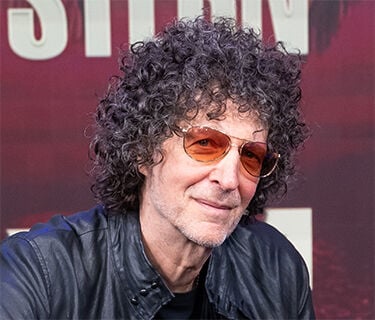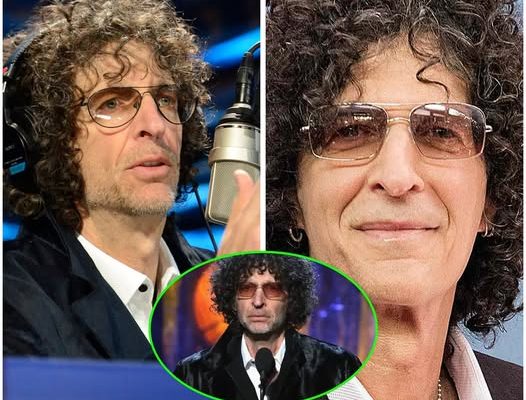The airwaves went quiet, then crackled back to life. In the middle of his summer hiatus, a time typically filled with curated reruns, the unmistakable voice of Howard Stern broke through the silence. It wasn’t a scheduled return. It was a brief, almost cryptic, live intrusion to reassure his flock. “For now, we will be back,” he promised, announcing a return on September 2nd after “refueling.” But the impromptu broadcast did little to quell the deafening roar of rumors suggesting that the self-proclaimed “King of All Media” might be approaching the end of his reign. The question on everyone’s mind isn’t just if he will leave, but whether he will be pushed from the throne he built.
The epicenter of this earthquake is a contract, set to expire at the end of 2025. For most celebrities of Stern’s stature, a renewal is a matter of lucrative formality. But reports are painting a different picture. One particularly damaging story alleges that while his long-time home, SiriusXM, is preparing an offer, it’s one they don’t actually expect him to take. It’s a move insiders might call a “lowball farewell”—an offer designed to be refused, allowing the company to claim they tried to keep him while effectively showing him the door. Is it a negotiation tactic, or is the satellite radio giant ready to move on from the man who once put them on the map?
To understand the gravity of this moment, you have to rewind to 2005. Terrestrial radio was shackling Stern with ever-increasing FCC fines and censorship. He was a provocateur in a world that was losing its patience for provocation. Then came Sirius, a fledgling satellite service, with a deal that was less a contract and more a coronation. The rumored figure was a staggering $500 million. It was an audacious bet that one man’s voice could build an empire in the sky.

When showing off his state-of-the-art Manhattan production studios back then, a space he proudly called “my crib,” the energy was palpable. This wasn’t just a new job; it was a revolution. “This is the first time I’ll be national,” he said, brimming with the freedom satellite radio promised. “The deal was a very big deal for me. It’s a step to the moon.”
And for a long time, it was. At his peak on traditional radio, Stern was an unstoppable cultural force. It was said that one out of every four cars stuck on the Long Island Expressway was tuned to his show. His daily audience was estimated at a colossal 20 million listeners. He wasn’t just a radio host; he was the unfiltered voice of the morning commute, the architect of a new kind of celebrity interview, and a master of controversial, can’t-look-away content. He built a universe of wack-packers, staffers, and bits that became a daily ritual for a massive, fiercely loyal audience.
But the media landscape of 2025 bears little resemblance to that of 2005. The moon landing he engineered has been followed by an entire universe of new stars. The very concept of scheduled, appointment-based listening has been eroded by the on-demand tsunami of podcasts and streaming services. Today, after nearly two decades behind a subscription wall, the numbers tell a startlingly different story. The audience that once numbered 20 million is now reported to be around 125,000 a day.

While some of that decline is a natural consequence of moving from free, public airwaves to a paid subscription service, the figure is nonetheless jarring. The king who once ruled a continent of listeners now seemingly governs a small, dedicated island. The world he once shocked into submission has moved on, finding new provocateurs and new conversations on platforms like Spotify, YouTube, and TikTok—arenas where the barrier to entry is virtually nonexistent and the potential audience is global.
This brings the narrative back to Stern himself, a man seemingly caught between his own legend and his desires for a quieter life. For years, he has flirted with the idea of retirement. “I keep planning it all the time and then they suck me back in,” he has admitted, hinting at a profound internal conflict. He speaks of a “black hole” inside of him, a void that only the microphone seems to fill, a need for the work that management has skillfully exploited in past negotiations.
Yet, there’s a weariness in his voice now. “It’s going to happen. I hope,” he says of retirement. “I’ve been looking for more free time… it would be nice to maybe stop and smell the roses a bit.” This public wrestling match with his own ambition has become a central theme of his later career. Is the fire that fueled his ascent finally beginning to cool? Or is the thought of his kingdom, however diminished, falling silent simply too much to bear?
:max_bytes(150000):strip_icc()/Howard-Stern-cb2a85380cb9457bb14825dd56581769.jpg)
If this is the end, it’s an exit as complex and layered as the man himself. Is he a victim of a changing media world that he, in many ways, helped create? Or is this simply the logical conclusion for an artist who has spent over 40 years pouring every ounce of his life into a microphone? The Howard Stern of today is not the shock jock of the 90s. He has evolved, becoming one of the most insightful and celebrated interviewers of his generation. But perhaps that evolution also made him less of a necessity and more of a luxury—a luxury that, in the cold calculus of corporate finance, may no longer justify a nine-figure price tag.
Whether he is pushed out by a calculated corporate maneuver, finally chooses to walk away and “smell the roses,” or pulls another masterful negotiation out of his hat, one thing is certain: the conversation around Howard Stern is a reflection of a much larger shift. The era of the singular, dominant media monarch is over. We now live in a world of fractured audiences and endless content choices. The static that threatens to overtake Stern’s channel isn’t just the end of a show; it’s the sound of a media landscape changing forever. The king may soon leave the castle, but the question will remain: did he abdicate the throne, or was he quietly and politely escorted from the grounds? We’ll be listening intently for the answer.



